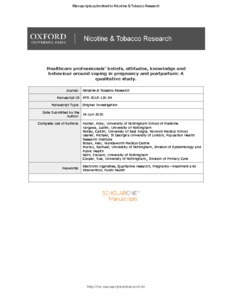Hunter, A; Yargawa, J; Notley, C; Ussher, M; Bobak, A; Murray, RL; Nath, S; Cooper, S
(2021)
Healthcare professionals' beliefs, attitudes, knowledge and behaviour around vaping in pregnancy and postpartum: A qualitative study.
Nicotine Tob Res, 23 (3).
pp. 471-478.
ISSN 1469-994X
https://doi.org/10.1093/ntr/ntaa126
SGUL Authors: Ussher, Michael Henry
![[img]](https://openaccess.sgul.ac.uk/112122/1.hassmallThumbnailVersion/2020-Hunter-NTR-acceptd%20version.pdf)  Preview |
|
PDF
Accepted Version
Available under License ["licenses_description_publisher" not defined].
Download (403kB)
| Preview
|
Abstract
INTRODUCTION: Finding effective ways to help pregnant women quit smoking and maintain long-term abstinence is a public health priority. Electronic cigarettes (i.e., vaping) could be a suitable cessation tool in pregnancy for those who struggle to quit, however, healthcare professionals (HCP) must be informed about these devices to offer appropriate advice. This study used the Capability, Opportunity, Motivation and Behaviour (COM-B) model and Theoretical Domains Framework (TDF) to explore HCP attitudes towards vaping in pregnancy and postpartum; beliefs about the health risks of vaping; perceived barriers and facilitators of vaping in pregnancy; knowledge of current guidelines and policies; and training needs. METHODS: Interviews (n=60) were conducted with midwives (n=17), health visitors (n=10), general practitioners (GPs) (n=15) and stop smoking specialists (n=18) across the UK. Interview transcriptions were analysed thematically using the framework approach and the COM-B. RESULTS: Discussing vaping as a tool for quitting smoking in pregnancy was prevented by a lack of capability (limited knowledge of ECs, lack of training in smoking cessation); lack of opportunity (restricted by organisational policies and guidelines, lack of time and financial issues impacting on training), and negative social influences (sensationalist media and stigma associated with vaping in pregnancy); and lack of motivation (fear of future litigation and comebacks should adverse effects from vaping arise). CONCLUSIONS: Factors related to capability, opportunity and motivation were identified that influence HCPs attitudes and behaviours towards vaping in pregnancy. Gaps in knowledge and training needs were identified, which could inform the development of targeted vaping training. IMPLICATIONS: E-cigarettes could be suitable in pregnancy for those struggling to quit smoking. However, healthcare professionals (HCP) must be informed about these devices to offer appropriate advice. These data extend our knowledge of factors influencing HCP attitudes and behaviours towards vaping in pregnancy. Generally, vaping was perceived as safer than cigarettes but a perceived lack of evidence, health and safety risks, dependency and regulation issues were concerning. Considering our findings, greater efforts are needed to ensure HCPs are sufficiently informed about vaping and guidelines available. More importance should be placed on training for all HCPs who have contact with pregnant women.
| Item Type: |
Article
|
| Additional Information: |
This is a pre-copyedited, author-produced version of an article accepted for publication in Nicotine and Tobacco Research following peer review. The version of record \Abby Hunter, PhD, Judith Yargawa, PhD, Caitlin Notley, PhD, Michael Ussher, PhD, Alex Bobak, MD, Rachael L Murray, PhD, Srabani Nath, MPH, Sue Cooper, PhD, Healthcare Professionals’ Beliefs, Attitudes, Knowledge, and Behavior Around Vaping in Pregnancy and Postpartum: A Qualitative Study, Nicotine & Tobacco Research, Volume 23, Issue 3, March 2021, Pages 471–478 is available online at: https://doi.org/10.1093/ntr/ntaa126 |
| Keywords: |
1117 Public Health and Health Services, 1103 Clinical Sciences, 1505 Marketing, Public Health |
| SGUL Research Institute / Research Centre: |
Academic Structure > Population Health Research Institute (INPH) |
| Journal or Publication Title: |
Nicotine Tob Res |
| ISSN: |
1469-994X |
| Language: |
eng |
| Publisher License: |
Publisher's own licence |
| Projects: |
|
| PubMed ID: |
32621745 |
| Dates: |
| Date |
Event |
| 2021-03 |
Published |
| 2020-07-05 |
Published Online |
| 2020-07-02 |
Accepted |
|
 |
Go to PubMed abstract |
| URI: |
https://openaccess.sgul.ac.uk/id/eprint/112122 |
| Publisher's version: |
https://doi.org/10.1093/ntr/ntaa126 |
Statistics
Item downloaded times since 07 Jul 2020.
Actions (login required)
 |
Edit Item |



